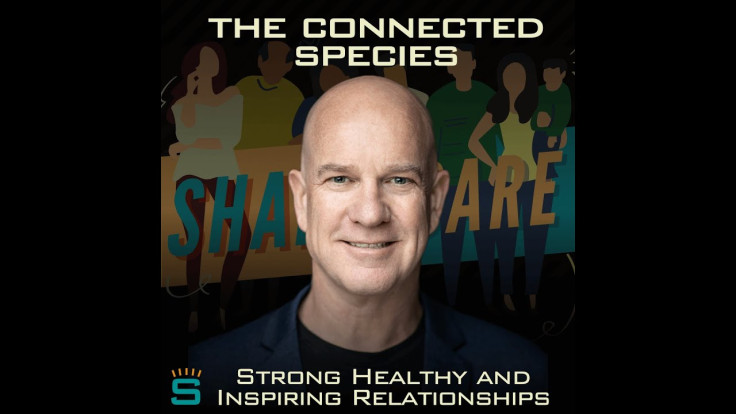Dr. Mark Williams' Book, 'The Connected Species,' Shows How Our Brains Made Us The Dominant Species

Despite not being the fastest nor the strongest species, humans have become the dominant species on the planet due to our unique brains, which are our most powerful tools. Contrary to popular belief, what sets apart the human brain is not its size relative to the body, but because it gives humans the ability to collaborate with each other in a way other animals can't. Not only can we connect within groups, but we can also connect across groups.
It's these peculiarities of the human brain, how it contributed to our rise, as well as how it works for and against us, that Australian cognitive neuroscientist Dr. Mark Williams tackles in his book ''The Connected Species: How the Evolution of the Human Brain Can Save the World.'' Published in the US in hardcover in August 2023, a paperback version will be released in Australia in August this year, followed by a US paperback edition soon.
The book has received positive reviews from readers and other academics. "In The Connected Species, Dr. Mark Williams interweaves history, psychology, and human health to tell the fascinating story of humankind. With warmth and humor, Williams explains how our species is shaped by a powerful drive to connect and affiliate—a drive that can both foster our greatest accomplishments and feed our worst inclinations," said Rebecca Schwarzlose, Ph.D., author of ''Brainscapes: The Warped, Wondrous Maps Written in Your Brain—And How They Guide You'' and neuroscientist at Washington University.
According to Dr. Williams, while some animals such as bees can work together amazingly, with each bee assuming different roles and creating huge hives, different colonies of bees do not have social relations with each other, for example, trade or alliances.
"We're the only species on this planet that actually connects across groups, and that requires a brain that is able to communicate across groups and is able to understand things such as body language, eye gaze, facial expressions, and emotions," Dr. Williams says. "Our brain allows us to empathize with each other and recognize large numbers of individuals, but also to recognize who's within our group, and who's not within our group, which determines whether we can trust someone."
The book explains how our brains evolved with a drive to connect with other members of our species, and that this drive changes how we perceive the world and how we relate with other people. The existence of in-groups, which are social groups that a person psychologically identifies as being a member, has a huge impact on how another person is treated. We see, hear, empathize with, and understand others differently depending on whether they are a member of our in-group or not.
Dr. Williams says it's the in-group, out-group phenomenon that explains how people on different ends of the political spectrum have different interpretations of the same speech by a political personality.
"What one side hears from the other is completely different, especially when it comes to politically polarizing figures," he says. "If you're part of their in-group, you hear one thing. But if you're not part of their in-group, you hear something different. A critic will interpret a speech differently than a fan."
Williams adds that the unconscious drive to connect draws people together, but it also emphasizes the differences between groups, contributing to negative attitudes such as racism, discrimination, and xenophobia. These are worsened by different factors, including overcrowding, technology, and the media highlighting people's differences rather than similarities.
''The Connected Species'' explains how we need to recapture the drive for connection in a way that will help us look past our differences and reconnect, even with those whom we perceive to be outside our groups. With technology and the COVID pandemic further worsening isolation and loneliness, which negatively impacts physical and mental health, people must make a conscious effort to make connections, but do so with an understanding of how this can backfire and work against us at times. This issue is particularly pertinent in schools, where real connections between a teacher and a student can lead to positive outcomes academically but also in a student's personal life.
Dr. Williams is an internationally recognized professor of cognitive neuroscience, with more than 25 years of experience in behavioral and brain imaging research, focusing on social skills. He taught the fundamentals of neuroscience to a wide range of undergraduate and postgraduate students and has published more than 70 scientific articles. Currently, he brings his knowledge and expertise to schools around the world, teaching both teachers and students how our brains work and how to keep them healthy.
Coming from a rural town in Australia, Dr. Williams had a rough youth and did not do well in school, with his school principal predicting that he'd be dead or in prison by age 25. However, his life took a turn when he lost two friends to drug overdoses, and he realized he had to set his life straight. After going back to school, he discovered his aptitude for the sciences, particularly neuroscience, and this kickstarted his academic career, spanning both MIT in the USA and various universities in Australia.
"I think my biggest issue when I was young was I avoided asking for help when I needed it. But we should all remember that it's okay to ask for help," he says. "I believe that it's a huge privilege to allow someone else to help you because you're actually doing them more of a favor than yourself. Giving help releases endorphins in the brain that make people feel better than receiving help."
© Copyright IBTimes 2025. All rights reserved.





















